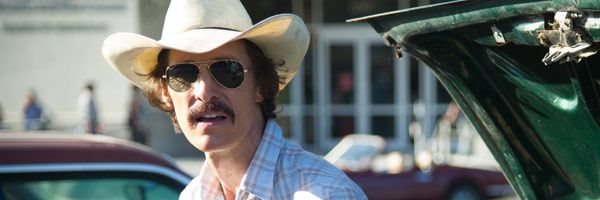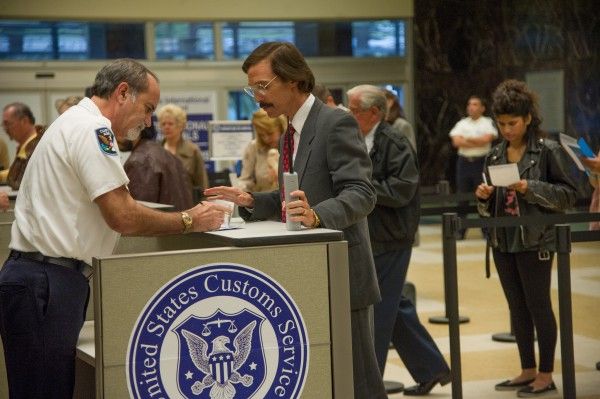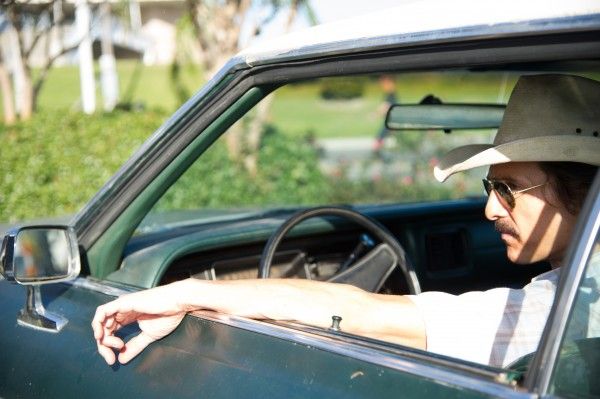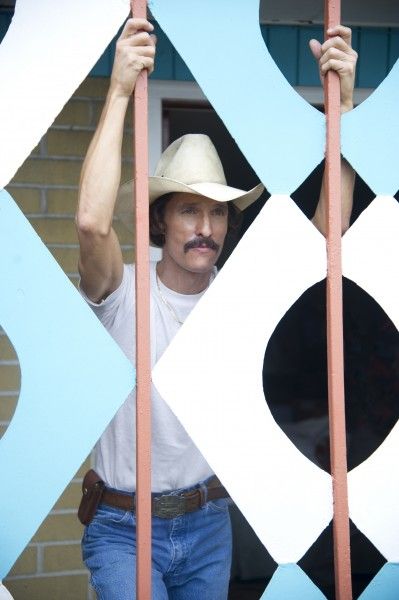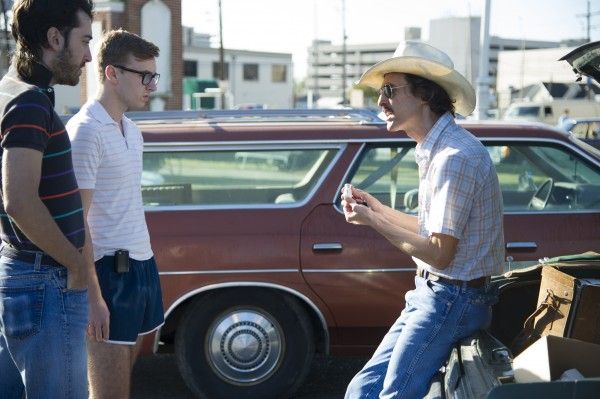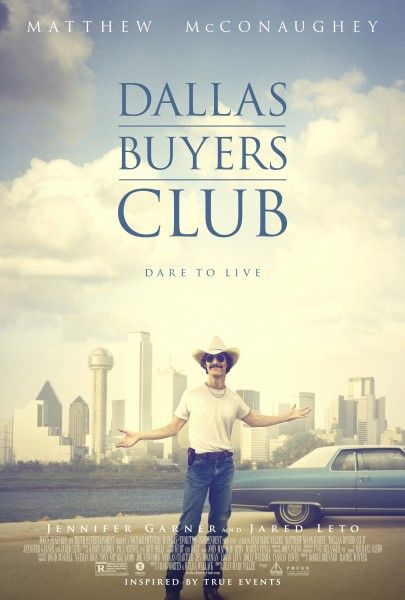Matthew McConaughey delivers a riveting performance in Dallas Buyers Club portraying the real-life Ron Woodruff, a homophobic Rodeo cowboy and electrician who suddenly, incredibly found himself on the front lines of the AIDS pandemic. Directed by Jean-Marc Vallee from a screenplay by Craig Borten based on true events, the film chronicles how Woodruff received a death sentence but defied the odds by fighting for survival and making discoveries that changed him and helped him inspire others. Opening November 1st, the compelling drama also stars Jennifer Garner and Jared Leto.
At our roundtable interview, McConaughey talked about having the opportunity to play several wonderful and very different roles recently in Magic Mike, Mud and Dallas Buyers Club, how he approached his portrayal of Woodruff as an imperfect man facing impending mortality whose self-interest is galvanized into something much more, how the script evolved during production, the accelerated shooting schedule, his research and preparation for the role, the surprising discoveries he made while reading Woodruff’s personal diary, how his dramatic weight loss helped him focus, and what he has coming up next including Martin Scorsese’s The Wolf of Wall Street, Christopher Nolan’s Interstellar and his new HBO’s dramatic series True Detective with Woody Harrelson. Hit the jump to read the interview.
QUESTION: You zing me with Mud at the beginning of the year and now you’ve got this one. These are some amazing films you’ve made recently with award worthy performances. Can you talk a little about that experience?
MATTHEW MCCONAUGHEY: Thank you. They were going to put Mud out last year but they held onto it and I’m glad they did. It came out early in the year. A lot of people saw it, but then now, it’s out. There are more people on the street so to speak that come up and have the most sincere love relationship with that movie. I think there’s something that takes people back to a really good spot with that. When I first saw it, I was like, “That’s the kind of movie that would have been a wide release in 1986.” Right? It kind of felt like the thing you went to the mall to see. I think it’s beautiful. I’m really honored by that movie. I love that film and that story, and I love that character. I got a couple of wonderful roles here. They are two great characters that are really quite different. I did Mud coming off of Magic Mike and it was a 10-day transition. And so, I was like, “How do I go from that guy Dallas to playing Mud?” because they’re very different. The one aspect that’s the same is they’re both dreamers, because if you remember Dallas in Magic Mike, he lived on Neptune. And then Mud, I was always like, “Oh yeah, he’s up in the clouds all the time.” Jeff Nichols wrote a beautiful script and we probably stuck to the script with a character that would have allowed a lot of improvisation – a storyteller, a bullshitter. Was he telling the truth? Was he not? We ended up so close to what Jeff wrote in that script. I gotta tell you, it was quite simple. What you see on the screen is exactly what he wrote and exactly what we shot. It wasn’t one of those where we shot a bunch of stuff and we’re like, “Where’s that scene?” I mean, it’s what we shot. There are maybe one or two scenes that aren’t in there but he really put together a beautiful film.
What about this film now? It’s based on a real person during a very critical period not only in his life but in history. How structured was the script with this?
MCCONAUGHEY: Jean-Marc and I talked about it. This is to follow this one man’s life. It’s not The Cause movie. It’s not about the plague. It’s not a docudrama. It’s not necessarily about HIV and AIDS. What’s original is that you’ve got a heterosexual man. We haven’t seen that story from that guy’s point of view. And, he doesn’t start off as this crusader for the cause. He’s not waving the flag. If anything, he’s a selfish son of a bitch who’s doing what he can to survive. And also, it’s the fact that it came out at the inception of HIV. Nobody knew what the heck this thing was. The doctors didn’t know. It was all a brand new frontier. So, here’s this two-bit cowboy electrician with a 7th grade education who becomes an expert, basically a scientist, on how to extend your life in a healthy way with HIV. And he was finding it out. It was the cusp. There was nothing to go off of. He just didn’t like what they were prescribing here, so he said, “I’m leaving the country. I’m going around the world. I’m going to figure out how to survive.”
How much structure was it? Craig Borten had written the script that was the basis. But then, Jean-Marc and I really got into it. I found out so much information about the guy when I went and met his family that I was always coming into scenes loaded with going with different things that Ron would do and how he spoke. And then, the other challenge was to keep him. Trust that if we keep him, this sort of bastard would want to make money, would want to be Scarface. If we keep him doing that, his humanity will come out of that and that he won’t go. Because when you first meet him, a lot of people were like, “I couldn’t stand him.” But you know what’s interesting? [It’s what happens] as soon as Rayon (Jared Leto) and Eve (Jennifer Garner) kind of bust him, and she goes, “I am a goddamn doctor” and then Rayon says, “Ten? Give me twenty-five.” The experience I had watching it with an audience was that the next time Ron came out with some blasphemous attitude, they were able to laugh because he had been busted in the movie.
I love Ron’s journey and I found it inspiring to see him become tolerant by the end of the movie. When you shot it, obviously you were at gay bars. How immersed did you get in the gay community?
MCCONAUGHEY: Well, pretty immersed in those bars you see me in, which was great because you’ve got Ron over in the corner going, “Oh no…” He doesn’t want to be there. But Rayon comes over and goes, “The one who has the honey attracts the most bees. C’mon. Play the part.” It wasn’t really like any kind of immersion into it. I gotta tell you, I had the blinders on. I had so much to do with Ron and we had 25 days to do it. I never looked in the rear view mirror. I didn’t have time to look in the rear view mirror. I never had time to get outside and look at, “Hey, what are we doing?” I just remember them yelling, “That’s a wrap” at the end of the film and me looking around and going, “Wrap-wrap or…?” And they went, “No. It’s over. We did it.”
Did that accelerated shooting schedule contribute to playing a character like Ron who was facing impending mortality?
MCCONAUGHEY: Yeah. Ron was just such a feverish son of a bitch. He was just attacking at all times. He was like a rabid dog. And so, we would show up on set on Day 1 and didn’t leave until that’s the day. We were not in a rush, but we were moving much faster than any movie I’ve ever been a part of. I don’t actually think we could have moved any faster. And a big part of that was Jean-Marc and I were real secure on what this story was and that allowed us still to come up with scenes. He added scenes. I added scenes. We added dialogue. We improvised. But we knew what movie we wanted to make. We were making the same movie, and we had to trust each other because there wasn’t time to go, “I’m not sure. Are we doing this right?” You couldn’t be precious about it. I’d go, “I don’t know if that’s exactly what we need, but I promise you that was true to Ron. Now, if you want to do another version, c’mon.” We wouldn’t talk about it. It was just, “Show me. Do it.”
What were some of the biggest surprises you discovered about Ron in the process of researching your character?
MCCONAUGHEY: When his family gave me his diary, it was like a Pandora’s box. I mean, I had all the interviews. I had the research that you see from the outside in. You see I had him, not just his words, but him on tape. And that was very informative. But that was after he had the Dallas Buyers Club and he was doing an interview with Craig Borten, the writer, about his Dallas Buyers Club. So, he’s a salesman. Right? And if you’re talking about yourself in retrospect, you talk about yourself differently than when you’re that person at that time. Maybe you romanticize things. Maybe you exaggerate certain things. Very quickly with Ron, I was like, “Ohhh…this guy. If it ain’t true, it outta be.” And that’s kind of one of his mantras. You know what I mean? So just go with him. But then, when I got his diary, I got his monologue. And that’s where I learned if you get the monologue to the man, then you can have the dialogue so to speak. So I knew I was opened up. When they gave me his diary, I saw who the guy was on Monday morning with his pager on charged, an electrician organized, waiting for the call that never came. I knew who the guy was on Saturday night getting high with himself, doodling in his book, writing poems and really blasphemous jokes, and actually wondering, “What’s with this life? I kind of want to get out of here.” You’d see what he’d wear. I was like, “Is this Halloween? He’s dressed up like a gangster.” And they’d say, “No. That was just one Tuesday.” And he loved these 30’s jazz bands and stuff.
He was wanting to get out of this time and this place, and this was before he had HIV. So he was already kind of stuck. I know a lot of people that have been like that. You’re stuck in a place. You’re kind of going nowhere. You’re going to shake it up on Sunday to get ready on Monday again because this week we’re going to get in line. We’re going to get some calls. We’re going to get a couple jobs. We’re gonna. And they don’t come. So we’re going to slip down to the Sonic or the Taco Bell at 11 because Patricia, she starts working at 11 behind the counter, and she’s kind of cute and she gives me fifty cents off those burgers. All of a sudden it’s two o’clock and I’ve been flirting with Patricia because I don’t have much else going on in my life. And maybe hopefully three months down the line, you’d see in his diary, “Patricia and I snuck off to the Ramada Inn and we got real…” And then, he’s got these endearing things like, “…in Room 62. 62, my new lucky number. If I go back and play football, my jersey will be 62.” These are endearing things that the guy is writing. And I go on and there are these doodles where you can just see him kind of drifting and wondering, and this was before he had HIV. So what I got from that indirectly, to come back to the hard truth, is that I could see the way I approached it was him getting HIV is what gave him the first purpose in his life. That was the first time when he had something that he could grab ahold of to fight for 24 hours a day, 7 days a week, every day until he was here no longer. So that’s where he immersed. That’s where he found a real identity. That’s where he found a purpose.
Your weight loss obviously attracted a lot of attention. What did your family think of it? Did your kids recognize you?
MCCONAUGHEY: Yeah, yeah. It was gradual for them so it wasn’t as alarming. It was more alarming when I would run into people that I hadn’t seen in months. But I had full support. My wife knows there are certain things I’ve got to do for the job. I did it as safely as possible. I’ve said this before. It’s easy to go with a narrative of “Oh my God. It was so hairy.” Yeah, it was hairy, but it definitely lent to my focus on the character because my life became very focused. I became very meticulous. So with all these things now in hindsight, I’m going, “That’s exactly what Ron was doing.” Plus, after he had HIV, it was like I remember the little things. They were going on early on, before he even had HIV, and especially after. He would have everything so meticulously laid out. He was like a clean freak. And then there was something that came up in the movie. Do you think he has a dog? Nope. You could have no animals. Now mind you he’s a bull rider in the movie, but there were certain things that [arose from] my myopic focus with my weight loss, because the weight loss wasn’t just the diet. It also means I wasn’t going to meet you all at the restaurant to have the discussion. I wasn’t meeting somebody out for drinks. I wasn’t going to put myself into the temptation of having a buffet of some food I like. Plus I was getting pale. If the sun was out, I came inside. So I was doing more writing, more reading, more researching. I was finding new ways to entertain myself because I wasn’t going out. There was no extroversion. And I’ll say this, for whatever energy I lost from the neck down, I got it added onto the neck up, which was also where Ron was coming from. He was a bull dog. And if you think about it, even if he was alive from the waist down, he couldn’t use it. And that’s another one of his tragedies which we handled in a tragic but comedic way. Jean-Marc and I did that a couple of times.
Was there anyone you had in mind who had HIV that personalized the experience of making this film for you?
MCCONAUGHEY: There was a certain buddy whose cancer was getting the best of him, and he had a lot of similar instincts to fight and characteristics that Ron had, and yeah, I secretly had some of this based on this guy and the way he was fighting against cancer.
What do you have coming up next?
MCCONAUGHEY: Mud is out. Dallas. And then The Wolf of Wall Street is supposed to be out this year. I’m not sure when. And then I’m making Interstellar right now with Christopher Nolan.
You also have a new HBO dramatic series with Woody Harrelson?
MCCONAUGHEY: Oh yes. True Detective which premieres on January 12th.
We’d better see you at the Oscars!
MCCONAUGHEY: Hope so!

